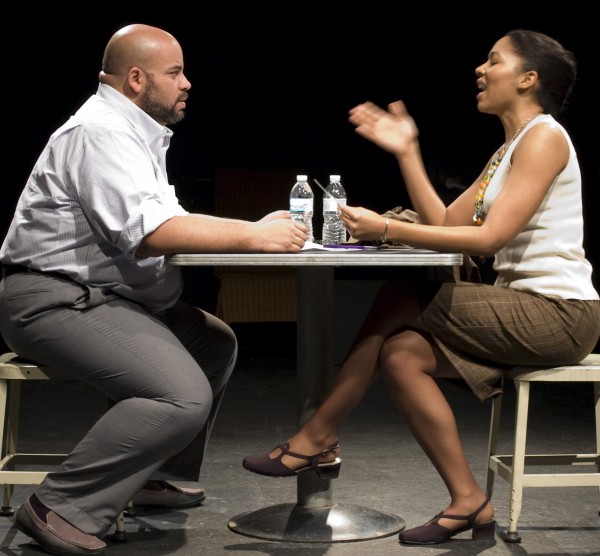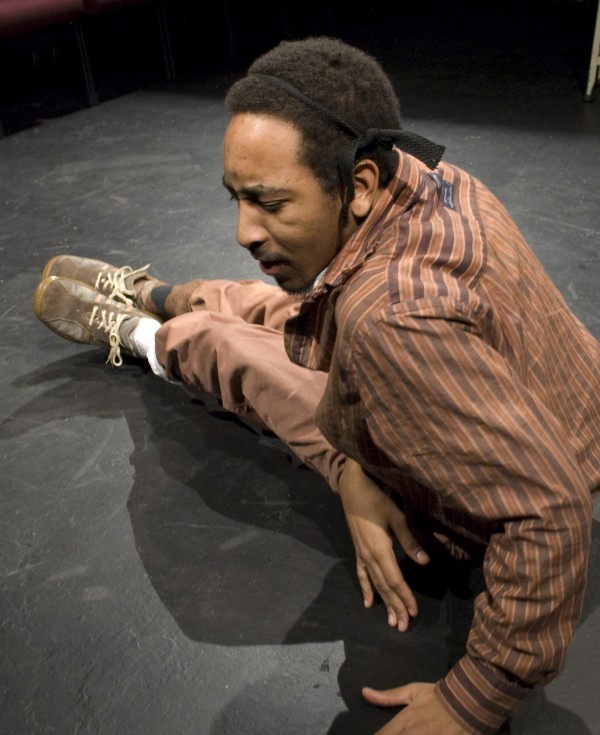
Weathervane Playhouse premieres new play set in Akron
Weathervane Playhouse, a Knight Arts grantee, commissioned Cleveland area writer Michael Oatman to create a play. That he did. His “Crazy Man,” which is set in south Akron, deals head on with some uncomfortable situations about race relations.
Oatman’s play begins with two young African-American students coming on stage talking about having just seen a black man “wailing” on a white man, beating him into the ground and really “messing him up.” Turns out the white guy died, but they don’t know that at this point. At first they seemed kind of glad seeing the usual racial tables turned, but one of them says something about thinking the white guy must have deserved it, but with a questioning kind of tone that shows he would be pretty rattled if the man didn’t.
That kind of unclearness and uneasiness runs throughout the play as other tense issues arise. Oatman doesn’t answer or resolve any of them really, but shows some possibilities through flashback scenes of the accused man’s life. Oatman leaves the audience trying to piece it all together, to imagine how something like this could have happened.
Usually in a drama, you get a central character (and indeed others) who have some motivation – or drive – that you see unfurled during the action of play. Oatman doesn’t do that in this play, and it can be off-putting if you’re both looking for a defining character trait and expecting it.
Tyson Sebree as John and Danea Rhodes as Regina, in “Crazy Man.” Photo courtesy of Weathervane Playhouse
In flashbacks we see that John (played with commanding determination by Tyson Sebree) has had his share of incidents that might have triggered his explosive, violent behavior. We find out his female African-American lawyer is in a lesbian relationship with his white wife (and he has known about that for some time). The condo association he heads has its share of pressures on him – from governing the board to heading off a tenant lawyer’s desire to buy another condo and expand his into it, and on to the crazy man who hangs outside the place acting weird and scaring the residents. The crazy man (an African-American) probably came from the local community center across the street where other people who are “undesirable” for John’s business tend to congregate. He wants to buy the place and move them out.
In one flashback scene, we see the incident that set everything off. John comes out of the condo building while the security guard is trying to roust the crazy man. John starts beating on him. A young white bicycle messenger tries to intervene to get him to stop. John turns on the messenger and beats him to death on the street.
Ironically, it turns out the crazy man wasn’t crazy after all. He had a growing brain tumor, the pressure from which made him seem bizarre. The lawyer who wanted to expand into the adjoining condo took advantage of John’s incarceration and got his spot on the association board. A final irony is that John’s wife, Sara, said that she had never seen even a hint of violent behavior.
Why did John do it? You don’t find out from him, for he resists all notions that his lawyer comes up with to defend him, including someone thinking maybe they heard the bicycle messenger use the “N” word. He didn’t, it turns out, but even if he did, John didn’t hear it. So he won’t let his lawyer go down that road.
John ends up committing suicide when faced with jail. Again, there’s no clear motivation for him doing so, except a slight hint that he thinks he owed it to the messenger guy, for the final scene is of the two meeting and John wanting to talk to him.
Obviously, Oatman’s is a fascinating and disturbing play. That makes for good theater. Sebree was extremely good in his central role as John. The teenaged young men who saw the beating in the first scene and who reappear later to play dice (Jermaine Lamar Harris and DeAndre Hairston-Karim) were spot-on for setting the mood and tone of the play, and for leading to its conclusion. “Bill” Eula Roberts, as the doorman of the condo and as a strident lawyer wanting to use John for his own purposes, was captivating in his range of characterization. Nicolas Walker, as the Crazy Man, was nothing short of brilliant in the nuances he provided to show a man truly off-kilter.
Nicolas Walker as the Crazy Man in “Crazy Man.” Photo courtesy of Weathervane Playhouse
At the Friday performance, some other members of the cast were uneven in characterization, and some were hard to hear, especially as they faced away from the audience in this theater-in-the-round take on the play.
Alan Scott Ferrall’s set worked well – letting doors define John’s apartment and the condo building on one hand, a table standing for the jail’s visiting center, and walk-on space being the setting for the street scenes. Erin Katz Ford’s lighting design shifted the audience’s attention to follow the action.
Michael Oatman’s “Crazy Man’ will be performed at 7:30 p.m. on January 21-22 and at 8 p.m. on January 23-24 in the Dietz Theater at Weathervane Playhouse, 1301 Weathervane Lane, Akron; 330-836-2626; www.weathervaneplayhouse.com. Tickets are $21 ($5 for students).
Recent Content
-
Artsarticle ·
-
Artsarticle ·
-
Artsarticle ·

